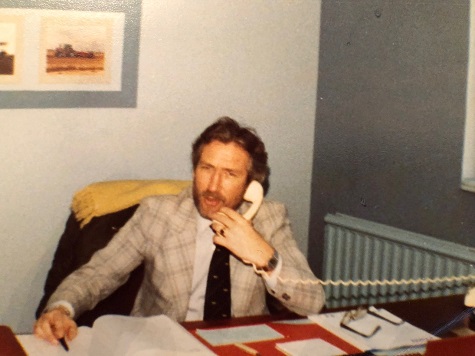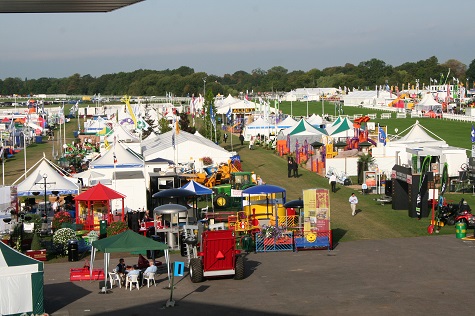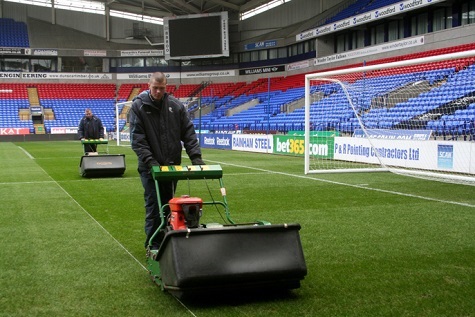
Last time Ian 'Poggy' Pogson told us about his early days working for machinery dealerships and the early days of demo-ing at the IOG shows at Motspur Park. Here he takes up the story . . .
Increased professionalism
Around the late 70’s, early 80s the industry had to become more ‘professional’ and to get ‘certificated’, as decreed by the government.
The words ‘professional’ and ‘government’ should never be seen in the same sentence in my view! But anyway, off we went on a course for a week to be educated, by a bloke who at a guess had never had any experience in front of the client base we had, (still, if you can’t do it teach, as the saying goes).
Brim full of the experience and knowledge we had been given, our next opportunity to show off our newfound expertise was at a dealer day on a golf course. We had equipment at various strategic points around the course and we were boasting, tongue in cheek of course, to the dealer’s staff and their sales force of how to be ‘professional’ when setting up machines and displays, presenting the company image etc. All the various sales aids to hand, presentations prepared, the day went off well. The only wayward things were the golf balls that wouldn’t go where they were supposed to (I thought you’re supposed to keep the ball on the short stuff!)
However, when the time came to load up all our gear, we had decided to collect the equipment at the farthest reaches of the golf course with the Land Rover and trailer. One piece of equipment was by a tee box on top of a hill. We, the ‘professionals’ decided to get on with it, got the ramps down and started to drive the tractor and attachment up the ramps. This, of course, has the initial effect of taking the weight off the rear of towing vehicle. “Hold on,” I can hear you say, “didn’t you put the stands down on the rear of the trailer?” We didn’t because being professional we didn’t want to mark the turf on this posh golf course.

Now, Land Rovers have transmission handbrakes effective on the rear wheels when they are on the ground. Lift up the wheels and what happens? Yep, they don’t work.
So there we were, the tractor half way up onto the trailer, the back wheels of the TD5 in the air and facing downhill - and it began to roll down the hill at an ever increasing speed! I shouted to the operator to either get on or get off. He thought I meant on or off the tractor, not get the tractor on or off. So he baled off the tractor and trailer. The unit was now gaining some speed/ I ran after it and fortunately, it being a nice day the driver’s window was down. I was able to get my head and shoulders to the waist in and heave at the steering wheel. The engine wasn’t running so it was only a partial steer, just sufficient to avoid a bunker and a dewpond at the bottom of the hill. It was an exciting ride, just over a 400 yards form the marker which fortunately was a concrete one and stopped the collection of Disco, trailer, tractor and attachment with me hanging my backside out the window!
Apart from a couple of grooves cut in the turf down the hill in the light rough by the tailgate, no damage was done. I thought we’d got away with this and breathed a sigh of relief. However, unbeknown to me, the dealer staff had taken the opportunity to have a round themselves and a foursome of the management could be seen at the top of the hill laughing their socks off, with cat calls and hoots of derision. “So that’s how professionals do it?!”
It took some living down I can tell you. Fortunately, camera phones hadn’t been invented then. Heaven forbid if they had - that would have made it into the annals.
On another occasion, a dealer had organised a similar event where after a very rainy night a newish golf club built on some strong ground, hosted the event. Present amongst us was a well-known brand of hillside tractor, with an experienced operator and a very green but enthusiastic sales rep. There would have been a couple of hundred people at the event and the idea was to have groups moving round. However, this young fellow hijacked most of the watches and said to his demonstrator to drive across the hillside.
“No,” was the answer from the demonstrator, “it’s too wet and slippery. It’s not safe.”
The rep replied “It’s a hillside tractor, of course it’s safe, it won’t turn over. If you won’t do it, I will.” The demonstrator answered with simple, “Please yourself”- and with that, in front of the assembled throng, the young greenhorn set off across the hillside in stately and confident fashion.
After about 40 yards the machine began to slip sideways on a patch where the water was coming out the built-up ground on the hill. A lack of experience immediately showed as the first thing he did was to put down the clutch and brake thus losing all traction. The hillside tractor promptly accelerated sideways a good 150 yards, where it disappeared into some scrub and woodland which stopped it before if fell 15ft onto a roadway.
The assembled gathering cheered and clapped before a thought of how the driver was. Of course we all eventually ran to help. And an extremely red-faced young man slunk off to the clubhouse, no doubt to get a clean set of underwear!
Further changes to groundscare
In my mind biggest change to the professional turfcare sector was the growth of colour TV and televised sport - football in particular. After the world cup in 1966 which was principally watched in black & white, we just assumed the playing surface was green. Usually only the FA cup was televised anyway, so the surface was incidental.

If memory serves it was when Murdoch and Sky got involved that the turnaround really occurred in earnest. After one particularly important match was played at Villa Park I think, the pitch was so wet and so heavily sanded that it looked like a beach, that the diktat came down to the FA from the TV people, ‘do something or we aint coming back!’ Clubs, the FA , and all and sundry had to buckle down. The groundsman then became a much more important figure.
The equipment available at the time was minimal. Other than mowers, we had a spiker for aeration, spreading sand was done by hand, and that was about it. The budget for the playing surfaces was minimal. One groundsman told me that the club owner wouldn’t give him the £1600 for a spiker, he had to use a fork. However, forward thinking turf professionals used their initiative and sweat of the brow. Machinery people, agronomists and plant breeders stepped up - and look where we are now. Our surfaces are the envy of the world.

We export groundstaff and greenkeepers to all corners of the world. Whether the influence of the foreign managers and players had a part is subjective, but the emphasis of ball speed, running speed, a less physical side of the game as opposed the traditional British hoick it up field and chase it, helped toward improving the standard of playing surface.
I clearly remember walking out onto the hallowed turf of Wembley in the early days. It was like walking on a mattress, with the thatch build up tremendous. No wonder players were always getting cramp. But there was little equipment available and little incentive or inclination to rip it to bits, decompact, aerate and reseed - a common and essential practice these days.
Another giant leap forward is the hybrid surfaces. New maintenance practises have been developed along with machinery and cultivars to make these an almost must have for anyone in the world who have aspirations in major sport.
We now have a range of equipment to renovate all types of surfaces. We have new cultivars, grow lights with different colours to stimulate the plant, carbon tents, under pitch heating, blowers, and stadiums that take into consideration sunlight. If I’d have told you this years ago, you’d never have believed me.
Looking ahead
We’ve come a long way in a short time, and it’ll continue.

With the growth of social media another big plus is having the access to everyone in the world from the comfort of your pocket. It can be annoying and destructive, but used in a positive way, what a great sales aid. During the recent lockdowns and subsequent passage of time, it has been a revelation and kept many companies afloat, moved machinery in our case, and kept everyone in touch with developments and techniques one way or another.
One of the downsides is the growth of the ‘Google greenkeeper/groundsman. Now every supermarket shelf stacker and forecourt attendant can be the ‘best’! How many times over the past few years have we heard the story of clubs or greens committees overruling sound greenkeeping practices because someone has done a level 1 online?!
So, let’s take the positives, dispense with the negatives and go forward with confidence and in the knowledge that whatever the shortcomings of our country, in one thing we do lead the world - our industry!
Furthermore, when folks go on about the good old days let me tell you – these are the good old days.
Make the best of them.